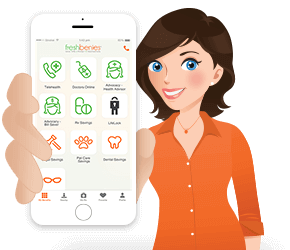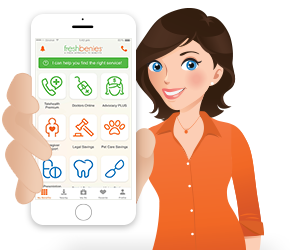10 WAYS OBAMACARE WILL AFFECT YOU!
OK, so some big stuff is going down with Obamacare that WILL affect you. If you’re like me, you have a hard time caring about super complicated government bills that may or may not happen or affect you. However, Joel Ray, CEO of a 100-employee specialty healthcare company, has this to say: “Regardless of one's political beliefs, our country is about to undergo a generational change in the delivery of healthcare to the American people.“
The bill is large and complex and by no means am I a politician or a lawyer (not that they could totally understand the bill either). So, please know that there is no easy way to explain all that’s in it, but I’ll do my best to break it down in a simple way (and maybe have a little fun while we’re at it)!
First, the name of the bill: you’ll hear it referred to as Obamacare, Health Reform, PPACA (Patient Protection and Affordable Care Act – I’m not gonna lie, I had to Google this to remember the actual name!) or ACA (Affordable Care Act).
What’s in it? 906 pages of pure FUN (or not)! On a side note, this is also the length of the entire Old Testament which includes 20+ authors and spans 3500 years, just sayin’. There’s so much in the bill that Nancy Pelosi said this "But we have to pass the [health care] bill so that you can find out what is in it, away from the fog of the controversy." Holy schnikes! To It’s also a tad concerning that the bill was passed over 2 years ago and most of us don’t really get it. To be fair: most of us are more concerned about the lives of Snooki, Honey Boo Boo and the Kardashians than the future of our healthcare.
First, let’s do a little history lesson!
You probably already know that the US is one of few countries where health insurance is delivered primarily through employers. Why? We gotta take the ol’ time machine way back to 1917 in Tacoma, WA when a logging company pre-paid doctors to handle employee accidents. In the 40’s during WWII, wages were capped by the government, so employers had to come up with other ways to attract and retain employees. They used benefit packages, including health insurance, as a way to do that!
And how do Americans get health insurance today?
Here's some approximate stats: 56% are insured through an employer, 16% are uninsured, 16% are on Medicaid (a program that provides healthcare for low-income Americans), 14% are on Medicare (a program that primarily provides healthcare for Americans aged 65+), 10% buy their own insurance, 4% are insured through the military. So, 34% of Americans are currently insured through government programs.
Some still hold out hope for a repeal, but there appears to be no stopping it and all the pieces are moving forward full speed ahead (although there have been delays).
Here are 10 things you should know about Obamacare and how they will affect you. As a result of the bill….
1) …each American MUST have health insurance.
In 2014, people without insurance will be fined $95 a year (or up to 1% of their income) and that goes up to $695 (or 2.5% of income) by 2016 (the fines for families are higher). This was questioned as “unconstitutional” - forcing people to buy something they don’t want (like when my mom would make me buy Christmas gifts for my dumb brother). The Supreme Court upheld this part of the bill saying that the government doesn’t have the power to order people to buy health insurance, but it DOES have the power to tax those without it. But seriously, with an average individual health insurance policy at, say $450 a month, some will probably just pay the $95 a year and move on? HHMMM…let’s compare: $95 penalty or $5400 insurance costs? I’m no brain surgeon, but…. Now, if you make $100,000 per year, at 1% of your income, your penalty could be $1000 vs. $95. And, that penalty is going to increase in the coming years, so it will make more sense to just get the insurance.
2) … there will be more people added to Medicaid AND subsidies for other Americans.
To ensure lower income Americans can afford quality care, this was to include expansion of Medicaid and subsidies to many Americans. Today, families of 4 making about $23,000 a year (or about $11,000 for a single – this is what’s known as 100% of the federal poverty level) are eligible for Medicaid. Under the bill, Medicaid would have been available to families making about $30,000 a year (or about $14,500 for a single – this is 133% of the federal poverty level). The check for some of this was to be paid by the States and the bill allowed for the federal government to pull funding to the states that didn’t comply. However, as part of the late June ruling, it was deemed unconstitutional for the federal government to pull funding from the states. So, each individual state will be making the decision on expanding Medicaid. In the news this week, many State governors are saying their states won’t participate. So, if you’re a family of 4 making between $23,000 and $30,000, you might consider moving to a rich and generous State! UGGHHH!
In addition, there are subsidies for families of 4 earning $23,000 all the way up to $92,000 a year (or singles between $23,000 and $44,000 – which is 400% of the federal poverty level). That is 63% of all Americans that will be receiving a subsidy (in the form of a tax credit) of some amount for their health insurance. The amounts will most likely be worth thousands of dollars, but that’s not all ironed out and it’s a moving target. How we’re going to pay for all this (yes, I said “we”) will come in a later post!
3) …insurance companies must change the way they cover Americans. How?
- they must insure people with pre-existing conditions at standard rates starting in 2014. Since everyone MUST have health insurance (see #1), you can understand why this would be part of the bill. Today, insurance companies can decide to insure or not to insure someone based on the person’s health. For instance, if you learned you had cancer and didn’t have insurance, you would only find VERY expensive coverage. In recent years, insurance companies were forced by the government to help with this problem by paying into a special state fund that offers a high risk health plan.
- they can’t impose lifetime limits – before, many insurance policies stopped at $1M (of course, it’s rare that this would happen). No more! Now, if you need care, you need care and the coverage never runs out.
- they must cover preventive services at no cost (i.e. annual check-ups, immunizations, mammograms, etc.). You’re probably already seeing this as it started in 2012. If you weren't aware of this, plan a free mammogram party with your girlfriends to celebrate....oh, the FUN! (or not)
- they must spend 80-85% of your premium payments on direct care and efforts to improve care quality.
4) …the state and federal governments are creating health insurance “exchanges”
These online sites will lead some Americans through the insurance buying process - kind of like an Expedia for health insurance that’s run by the government. For people who get insurance through an employer, most will continue that way. For people who buy insurance as an individual: a) if you qualify for a subsidy, you will go through the exchange and b) if you don't qualify for subsidy, you could still use the exchange or continue buying through your current channel (a broker or directly from an insurance company). There’s a lot still being ironed out with the exchanges, but if the experience is anything like a trip to the DMV, it could dicey! The Illinois exchange will include 165 insurance plans from 6 different insurance companies. I don't know about you, but I get confused when 3 options are put in front of me! Brokers can still help guide you through it all to find the best plan.
5) …Employers will be impacted.
- Employers of more than 50 employees (4% of all employers in the US) will be fined if they don’t provide medical insurance coverage at a set amount (this amount hasn't yet been determined).
- Employers with less than 50 employees (96% of all employers in the US) won’t be fined for not providing medical insurance.
- Most employers provide health benefits as a way to attract and retain quality employees. Some employers will choose to continue to provide these benefits as a service to their employees. Some employers may choose to get out of it and tell their employees to find their own insurance. Then, they could raise wages to make up the cost or give a specific dollar amount to each employee as a perk to help them pay for their benefits?
- Obviously, employers will face more government reporting, paperwork (i.e. proof on your tax return that you have the legal amount of insurance), as well as additional communication to employees about the new laws.
- In 2014, when everyone MUST have health insurance, employers may see a spike in enrollment from employees who have previously declined coverage.
- Based on recent polls, most employers are unsure of what to do, don’t feel prepared and don’t fully understand all the implications of the bill. For now, that’s probably OK because their employees feel the same way.
6)….effect on kids and the elderly
We are living in the age of the sandwich generation where many families are caring for children and aging parents at the same time. Here’s a few points on how health reform will affect these two groups:
- See point #3 above. These insurance coverage changes also apply to kids and the elderly.
- Kids up to the age of 26 can continue being covered under their parent’s insurance plan.
- Kids under the age of 19 are eligible for more services at no extra charge, such as dental/vision coverage, hearing tests, fluoride supplements
- Pregnancy and newborn care must be covered on most insurance plans
- Children’s Health Insurance Program (or CHIP which is the equivalent of Medicaid for kids) state funding must be maintained at its current level. In other words, if states need to cut funding, they’ll have to find somewhere else to do it.
- More prescription drug costs will be covered for those on Medicare.
- Hospitalized Medicare patients will have access to the newly created Community Care Transitions Program to coordinate care and connect them to needed services once they leave the hospital.
- There will be more information about nursing home inspections and complaints accessible to the public.
- A new Center for Medicare & Medicaid Innovation will test new ways of delivering quality care while decreasing costs.
7)....more taxes and fees!
If you’ve read points #1 - #6, you may have noticed that the bill adds quite a few “covered” services and programs. In points #7 - #10, we'll look at how it’s all going to be paid for. According to the Treasury Inspector General, who oversees the IRS, the health care law “includes the largest set of tax law changes in more than 20 years.“ Yikes!
Which of these might impact you?
- One of the biggest tax law changes was discussed in point #1 – all Americans must have a minimum level of health insurance coverage or they will be taxed. Each state has determined “the minimum level of coverage." I’m a pretty healthy chick with an inexpensive, high-deductible insurance plan, so I’m hoping the government doesn’t require me to have more insurance coverage than I want/need…we’ll see what the cost will be in October 2013
- Annual fees or taxes on health insurance providers, branded drug manufacturers/importers, medical device manufacturers/importers (hhhmmm…wonder where that’s going to come from – you can raise your hand now)
- Increased taxes for those that make $200,000 a year (or $250,000 for couples)
- Additional taxes on unearned income of over $250,000 (dividends and capital gains)
- 40% tax on expensive employer-paid health insurance policies (premiums of $10,200 for individuals or $27,500 for a family)
- 10% tax on indoor tanning services
- Fees charged to businesses with 50 or more employees if they fail to offer the “minimum level of coverage”
8).…how you get health insurance may change
Most Americans get their health insurance through an employer. Employers are trying to understand how they’ll be impacted by the Bill (see point #5). Will they provide insurance for their employees in the future? Will they tell employees, “here’s $X for your insurance expenses – go figure it out”? Sears and Darden Restaurants just announced they would give employees a chunk of money to purchase their own insurance from an online marketplace or “exchange” (see point #4).
Many Americans purchase insurance for themselves – using a broker or directly from an insurance company. They, too, will have the option of going directly to an exchange.
It’s expected that these exchanges will have MANY more options to review. Whew, you might have to take a day off to help figure it all out every year!
So what, you ask?
Most of us are used to getting 2 or 3 insurance plan options handed to us and we choose from this small selection.
Here’s a tip: start calculating what your family spends on healthcare. That way, when you’re faced with choosing from, say 25 plans through an exchange, you'll go with the plan that’s right for your health and wallet!
9)….seeing a doctor could be a challenge
Once healthcare reform is in full swing, it is estimated that 30+ million people will be “added to the system.” In addition, there will be about 36 million Medicare additions. And once all these people have insurance, their usage of the healthcare system will double (just like if you finally took your car in for a checkup after three years without so much as an oil-change).
The US was projecting a Doctor shortage WAY before healthcare reform. As a result, you’ll certainly feel the bottleneck at your Doctor's office.
Do you think “oh, that’ll never happen”? Caution! Here’s why: 10% of Canadians can’t get assigned to a primary care physician because there aren’t enough of them and wait-times for visits and surgeries are longer than ever in Canadian history.
Here’s another tipoff that it won’t be pretty in the USA: the day after the Supreme Court upheld most of the healthcare bill, Hospital stocks increased dramatically. What could that mean? Investors are putting their money on the promise of busy hospitals in the future!
Not that we love doctor visits, but we sure do want quick access when we’re feeling under the weather. Unfortunately, based on the stats, we need to prepare for “slower” access!
10) ….costs will continue to increase and confuse
The bill will cut costs for many Americans and will result in higher costs for others.
Regardless of how that shakes out or your personal political opinion, we can all agree that cost increases will continue. Why? Because the underlying cost of healthcare is rising. We’re Americans, we want the best of everything and we certainly don’t want to limit our healthcare. Advancements in technology, pharmaceutical development, hospitals that look like 4 star hotels, increased life spans, increased waistlines, etc….all these things contribute to higher costs.
And remember, the bill doesn’t really simplify the healthcare system. Most Americans find it complicated and hard to navigate. While we love our country, the US Government isn’t known for simplifying things! So, there’s no end in sight for the complexities of “the system.”
In the end, American consumers are pretty well split on their views about the ACA bill: 38% say it’s a good start, 29% say it’s a step in the wrong direction and 34% don’t really know. Time will tell and we’ll continue to provide helpful updates….
If you haven’t read these helpful posts, we’re sharing simple tips to help save $$. Managing your healthcare needs doesn't have to feel like a root canal! :-)
Surviving Obamacare Simply (SOS) Series
Vision Insurance: 4 Things To "Look At"
Dental Insurance: 3 Things To "Chew On"
3 Tips for Saving on Healthcare Costs

















